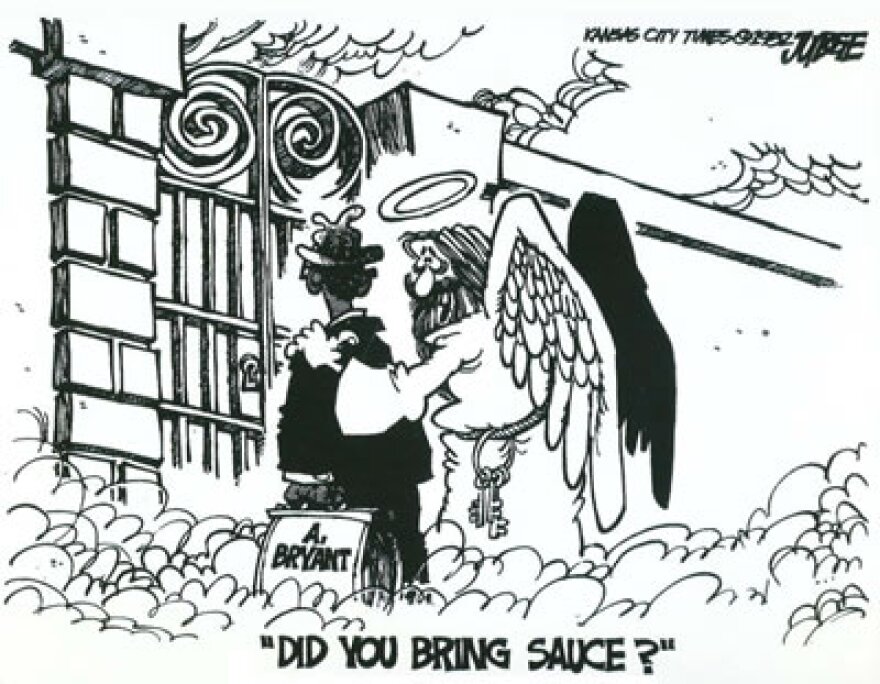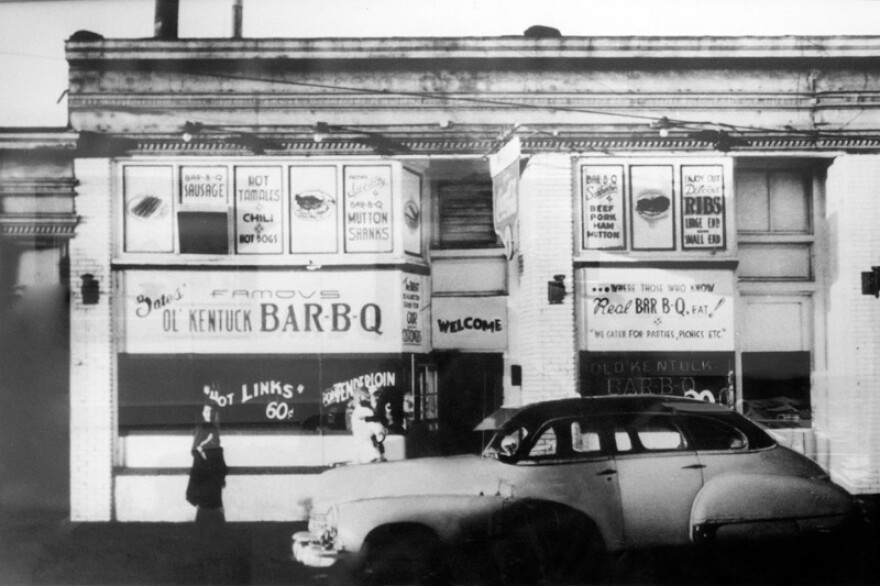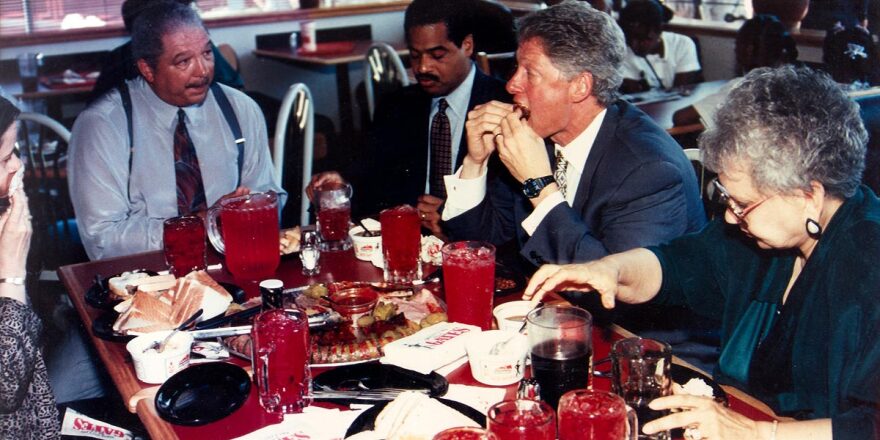Mark your calendars. Saturday will go down in history as the day the nation got hip to something that much of Kansas City already knew: Ollie Gates and Arthur Bryant are two of the most important figures in American barbecue history.
The two Kansas City restaurateurs behind the Gates Bar-B-Q chain and Arthur Bryant's Barbeque, respectively, will be inducted into the Barbecue Hall of Fame Saturday at the 2021 American Royal World Series of Barbecue at Kansas Speedway. Bryant, who died in 1982, is being inducted as a legacy inductee.
“When you talk about Kansas City barbecue history, that’s the pivotal rivalry, right? Gates or Bryant’s? For a long time, you had to be on one side,” said Adrian Miller, a member of the nominating committee for the American Royal Barbecue Hall of Fame.
Kansas City inductees from previous years include Henry Perry, the father of Kansas City barbecue, Jeff Stehney, co-founder of Joe’s Kansas City Bar-B-Que and Dr. Rich Davis, the creator of KC Masterpiece Barbecue Sauce. The other 2021 national inductees are Meathead Goldwyn, Rodney Scott and Lyttle Bridges.
Miller, a James Beard Award-winning author based in Denver, was invited to join the nominating committee in 2019, after being openly critical of its lack of diversity. At the time, Henry Perry was the only African American inductee among 27 inductees, a shocking fact when considering the legacy of Black barbecuers in America.
“I think we’ve made a lot of progress,” Miller explains, “and I can't claim complete credit for it because I have some like-minded people on the board who want to see more diversity. The challenge now is there's so many people we could be recognizing and we can only do a few at a time.”

In addition to making Kansas City barbecue popular nationally, Arthur Bryant and Ollie Gates are also unique figures in their own right. Bryant is the quintessential Kansas City pitmaster who comes to mind across the country, according to Miller, but Gates Bar-B-Q is a rare example of a Black-owned barbecue restaurant with multiple locations.
The fact they were born a generation apart makes the coincidences in their stories and where the two diverge all the more interesting.
To start, Arthur Bryant arrived in Kansas City in 1931, the same year Ollie Gates was born here. Bryant, a Texas man, merely intended to visit his brother, Charlie — but once he came, he never left.
You don’t have to look far for the reason why. Charlie was an apprentice under talented pitmaster Henry Perry — and when Perry offered Arthur a job, he couldn’t say no. Charlie inherited Perry’s business in 1940 when he died, even though he had already started his own restaurant — and then Arthur took over when Charlie retired in 1946.
The first thing Arthur Bryant did once he was in charge was tone down the barbecue sauce. According to what he told a reporter, Bryant thought “Old Man Perry” and his brother had been overindulging in cayenne pepper for years. Supposedly, the sauce was so peppery that it would literally bring tears to customer’s eyes: “I told them … but they wouldn't believe me."
“I don’t know how exactly Arthur Bryant or Henry Perry made it, but you used to set the bottle down and about two or three inches of some kind of lard or grease would come to the top. That’s the way it was when I was very young,” said RJ Pittman, nephew of Doretha Bryant, Arthur Bryant’s niece.

Bryant also changed the restaurant’s name from Charlie Bryant’s to Arthur Bryant’s and eventually relocated it to 18th & Brooklyn.
Bryant never messed with the original "grease house" aesthetic, though. Upgrading the joint with air conditioning and plastic top tables was okay, he reasoned, but if you got too fancy with things like a “dark interior” or “plush seats,” you’d be too far removed from what the place was about in the first place.
To be clear, the point of Arthur Bryant’s was — and still is — tasty, no-frills barbecue.
Bryant is also the originator of burnt ends, the crispy shards of meat cut from the point end of a smoked brisket that have become Kansas City’s ultimate claim to fame. Usually thrown away as scraps, Bryant would instead collect them on a tray and give them as a snack to waiting customers. They’re one of the many reasons writer Calvin Trillin pronounced Arthur Bryant’s as the “single best restaurant in the world” in 1972.
No matter how famous he got, Bryant refused to franchise the joint — in spite of numerous offers. A 1975 article detailed that the thought of franchising nauseated Bryant “worse than store-bought barbecue sauce on undercooked ribs.” Many nights, you could find Bryant sleeping on a cot in the back room, watching over the place.

The same year that Arthur Bryant took over his family business, George and Arzelia Gates, Ollie Gates’ parents, purchased Ol’ Kentuck Bar-B-Q at 19th and Vine, renaming it Gates Ol’ Kentucky. Prior to 1946, Ol’ Kentuck was a thriving jazz and barbecue joint — it’s even where Charlie Parker and Dizzy Gillespie first met in 1940.
Ollie Gates was just a teen, but he recalls that they came to learn barbecue “the Henry Perry way” from Ol’ Kentucky’s pitmaster Arthur Pinkard, another one of Henry Perry’s apprentices.
After graduating from Lincoln High School in 1949, Gates eventually went to college in Maryland on a football scholarship — only to transfer to nearby Lincoln University in Jefferson City a few years later so he could help his parents grow their barbecue business in Kansas City.
“The barbecue industry at that time wasn’t a reputable kind of business. It was an after hours speakeasy type of business,” Ollie Gates told Candacy Taylor, author of Overground Railroad: The Green Book and the Roots of Black Travel in America.
It may not have been a "reputable" business, but Gates Bar-B-Q was a refuge for African Americans traveling through the Jim Crow-era United States between 1948 and 1967. Several Gates locations were featured in the annual Green Book, a travel guide that identified restaurants and hotels where African Americans were welcomed.

George Gates passed away in 1960, but under Ollie’s leadership, Gates Bar-B-Q grew quickly in the 60s and 70s, opening up more and more locations. While Arthur Bryant mostly kept things the same and managed almost everything by himself — Ollie Gates made a name for himself by doing the reverse.
For instance, Gates favored a more upscale appearance. He kept his restaurants extremely clean, going so far as to minimize the accumulation of smoke inside the restaurant. The legend goes that he was even originally opposed to selling burnt ends, appalled by the thought of purposely selling burnt food to customers.
“Arthur Bryant’s was really tapping into the old school view of barbecue,” Adrian Miller said. “Gates was more service-minded.”
The famous “Hi, may I help you?” that greets every customer at Gates is part of that — but it’s really just the tip of the iceberg. Gates even started a barbecue university called Rib Tech to train employees and standardize practices among restaurants.
“What I claim for myself is that we made a business out of the barbecue industry,” Gates said. “I’m the one that packaged it up and gave it a new face.”
Apart from their exceptional barbecue skills, part of the reason Ollie Gates and Arthur Bryant are still so widely respected today is because they popularized Kansas City barbecue on the national stage — and part of that has to do with baseball.
“One of the greatest things that happened to Kansas City was 1954, when they brought major league baseball to Kansas City,” Gates said at a Kansas City Public Library event in 2011. “You can attribute the growth of barbecue to major league Kansas City football and baseball.”
Before the Royals played at Kauffman Stadium, Municipal Stadium at 22nd and Brooklyn downtown was where Kansas Citians went to cheer on the home team in the 50s and 60s — and it was surrounded by barbecue restaurants like Gates and Bryant’s.
“We permeated the air with those obnoxious odors of barbecue,” Gates said. “People going up to the ballpark would smell a load and [ask] ‘Where is that odor coming from?’”
Gates said they would regularly rush up to the stadium to give Kansas City Athletics announcers like Merle Harmon a plate of barbecue mid-game — prompting them to boast about how great it was to the masses. Then fans and sportswriters alike would go and seek out the source of the sweet-smelling smoke, much to Gates' delight.

As Kansas City continued to become known as a national barbecue destination, VIPs started showing up to both Gates and Arthur Bryant’s to taste what all the fuss was about. Think Hollywood stars like Robert Redford and Jack Nicholson — in addition to presidents like Harry Truman and Bill Clinton.
“I heard that [President] Truman played cards in the back of Bryant’s,” RJ Pittman said.
Nothing could stop the floodgates of attention. Count Basie would supposedly order ribs from Bryant’s and spit on them to ensure they were left alone by his band mates.
Even today, Gates and Bryant’s are still two of the most iconic Kansas City restaurants, in spite of the 100 other barbecue restaurants that exist in the area. The Bryant family hasn’t managed Arthur Bryant’s for decades, but Pittman said pride for the family business still runs deep.
“I used to have an uncle who’d get up and put on an Arthur Bryant’s hat every day,” Pittman said. “Everybody I know would have good things to say about Arthur Bryant. And that is amazing to me.”
When Bryant died in 1982, Ollie Gates told the Kansas City Star that Kansas City’s barbecue industry would suffer as a result — but Gates admitted he did not know Bryant personally: "I was probably too busy competing with him.”

This year, Gates Bar-B-Q celebrates 75 years in business — making it one of the oldest family-owned restaurants in Kansas City. At 90, Ollie Gates is the proud parent of five children and eight grandchildren, some of whom are still involved in the business today.
“I don’t know what the real future of the restaurant business is for us in Kansas City,” Gates said in 2018. “All I know is that if you don't grow, and you stay the same, you’re dying.”
Gate Bar-B-Q’s chain of six restaurants looks different today than the original Gates Ol’ Kentucky — but their ever-optimistic logo serves as a gentle reminder of their roots at 19th and Vine: “Struttin’ Man” was inspired by Louis Armstrong’s “Struttin’ With Some Barbecue.”
“We had to make folks realize that regardless of how you’re dressed, whether it’s in rags or riches, everybody can strut with Gates Bar-B-Q,” Gates explained.
When it comes down to it, what makes Kansas City barbecue so good is simple to Gates: “Barbecue is personality. What you like in a town and the guy that’s fixing it.”






